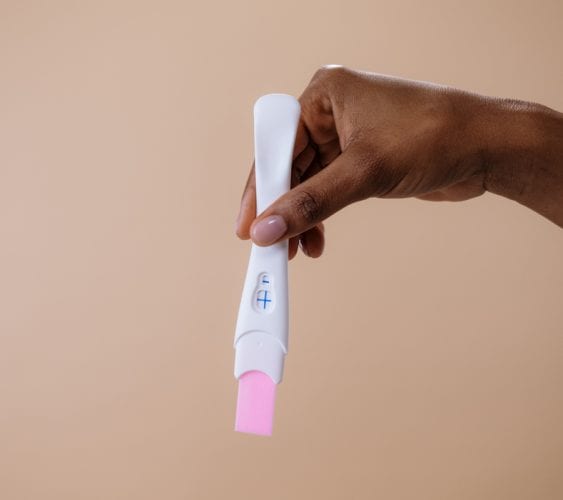Why is my period late?
We’ve all been there at some time or another. Your period is due… you wait for the tell-tale ‘signs’ that it’s hit… the day goes by and… nothing. You may think little of it, but as you head to bed the next day, or the day after that, and your period still hasn’t made an appearance, you might well be starting to wonder why your period is late. And what does this mean?! We turned to Mooncup Advisor, Sophia Jordan, to find out!
All you need to know about the frequently asked question: why is my period late?
The menstrual cycle is not a static event and, just like everything else in the body, it fluctuates in response to what else is going on. Life happens… and our bodies respond!
We are taught that the ‘average’ menstrual cycle lasts 28 days – day one being the first day of our period. Around half-way in (day 14), ovulation occurs. However, in reality, our menstrual cycles come in a much wider range of shapes and sizes, just as we do! Anything between 21-35 days is considered within the normal range. Some people find that their menstrual cycle settles into a regular pattern, whereas others find that it varies a bit and that this is ‘normal’ for them.

Getting to know your period pattern
If you don’t have a sense of what your average cycle pattern is like, if your cycle is irregular, or if you can’t recall when your last period was, then it can be hard to know if your period is late. This is where getting to know, understand, and keep track of your menstrual cycle can really help.
Your cycle is not just about the start dates of your period but also about any other signs – such as ovulation, discomfort, or changes in your vaginal discharge. There are plenty of options if you want to try keeping tabs on your cycle: from a good old fashioned diary entry, to your phone calendar, or one of the many period tracking apps out there. Find what works for you and see what pattern emerges!
However, if you do generally have a regular cycle and you don’t begin to bleed when expected, then read on as we explore some of the reasons why your period may be late.
13 reasons why your period may be late
1. Pregnancy
To prevent any proverbial ‘elephants in the room’, let’s get this one under our belts first! If your period is running late, ask yourself: “is there any chance I could be pregnant”?
It’s fine to wait a few days after you would have expected your period to start to see if it’s just running late. However, if it still hasn’t made an appearance after that, and you have had sex, then it’s best to take a pregnancy test. You can take most pregnancy tests from the first day of a missed period. If you’re not sure when your next period is due, the NHS recommends doing the test at least 21 days after you last had unprotected sex or when you suspect your contraception may not have worked. Some pregnancy tests advertise that they can be taken earlier than this. It is worth bearing in mind that accuracy of these tests can vary at such an early stage in a pregnancy.
Pregnancy tests are widely available in pharmacies and supermarkets, but you can often get one for free from your doctors’ surgery, contraception & sexual health clinic, or NHS walk-in centre, as well as some pregnancy advisory services. You can contact your GP, doctor, or sexual health clinic for advice about taking a pregnancy test, or next steps if you have a positive result. More information is available on the NHS website.

2. You are just starting your periods
Your first period may be light and short, then you might not have another one for several months. In fact, it’s very common for it take a couple of years for your periods to settle into any sort of more regular pattern. Your body is essentially tuning in to the rhythm of your hormonal ups and downs as your menstrual cycle settles in. It can take some time to get used to having and managing your periods, so it’s worth having a chat with an adult you trust (especially one who’s had periods). You may find it useful to check out our young person’s guide to period products.
3. Post-birth or breastfeeding
After giving birth, it can take some time for your periods to return. You will have some bleeding (called ‘lochia’) in the days and weeks following the birth, but this is different from a menstrual period. Remember to only use external protection such as pads in the six weeks following giving birth.
The type of birth you had, your recovery from this, and how you are feeding your baby, can all affect how soon your periods return. It is common for those breastfeeding to find their periods take some time to resume.
You may also find that your periods change after giving birth. You may notice differences in how heavy your flow is, how regular your cycle is, and other period-related symptoms. Your hormones have had a huge shake up so it can take some time for them to settle down into a new rhythm.
4. Perimenopause
At the other end of your menstruating years, the frequency, regularity and heaviness of your periods can change as you approach the menopause (literally the ‘pause’, or stop, of menstruation). The menopause is a natural part of getting older and most commonly occurs between the ages of 45 and 55. However, for some people it can occur earlier, either naturally, or as a result of medical issues or treatment.
In the years building up to the menopause, you enter a new phase in your menstrual timeline, called the ‘perimenopause’. While it can vary significantly from person to person, the average length of the perimenopause is thought to be around four years.
During perimenopause, changes in your hormonal balance (particularly oestrogen, progesterone and testosterone) can lead to a range of different physical, emotional and mental effects. Changes to the regularity, frequency and heaviness of your periods is an almost universal experience at this time, so having a late period isn’t necessarily be a cause for alarm.
It’s also worth bearing in mind that other life changes often coincide with perimenopause: think children going through their teenage years and flying the nest, career pressures or taking on care for older relatives. They can all bring its own stresses and strains which may impact on your menstrual cycle (more about this in a bit!).

5. Changing your contraception
If you have recently started, changed, or stopped taking any form of hormonal contraception then the likelihood is that you’ll see a change in your periods as your body’s hormonal balance adapts. This can lead to periods becoming more or less regular, changes in frequency including late periods, or changes in how heavy or light your period is. Some forms of hormonal contraception may stop your periods altogether. The effects will vary according to the type of hormonal contraception you are using and your personal physiology. Your doctor or sexual health nurse will advise you on what to expect when changing contraceptive, and you can also find lots of helpful information on the NHS website.
It’s important to keep in mind that no contraceptive is 100% fail-safe at preventing pregnancy. So if your period it is later than expected, you may want to take a pregnancy test and discuss this further with your healthcare professional. If you have recently upped your exercise and your periods have become irregular or stopped altogether, then we’d recommend talking to your doctor.
6. Stress
Your mind, emotions and body are closely intertwined, and it’s common knowledge that changes in how you are feeling can have a direct, and sometimes very significant, impact on your physical wellbeing.
Your periods are no different, and studies have indicated that acute significant stress or chronic stress over a longer period of time can cause longer, shorter, less frequent and more painful periods. In some cases it can actually mean your periods stop altogether.
The hypothalamus gland, located in your brain, is often seen as a kind of conductor to the hormonal orchestra that regulates many parts of your daily life. These include: how you sleep, eat, feel, our temperature, as well as the regularity of your periods. When you are under stress, emotionally or physically, you produce more of the hormone cortisol, which can affect the functioning of the hypothalamus. Result? Potentially experiencing changes in ovulation and your periods.
A survey conducted by Mooncup during the Covid-19 lockdown found that 79% of participants reported a change to their menstrual cycle during the pandemic, with many reporting a correlating change in their stress levels.
Because we are all different, there is no specific level of stress which our bodies can tolerate before it starts to affect our menstrual cycle. If you feel that you are experiencing overwhelming and hard-to-manage stress, that is having a negative impact on your health, we’d recommend reaching out to a healthcare professional such as your doctor for support.
7. Your diet
Food and drink provide fuel for all of the processes in your body – your menstrual cycle included. Your diet can have a significant impact on your periods, and not getting enough of certain nutrients can make periods irregular, late, or even stop them altogether.
The nutritional foundation of a healthy menstrual cycle requires enough carbohydrates, protein, fats and fibre. Strictly restricting any of these in your diet can affect your body and its reproductive system’s ability to function effectively. It’s also important to ensure you’re getting a good range, and enough minerals and vitamins. A diet lacking minerals and vitamins including: iron, calcium, magnesium, folate, zinc or Vitamins B, C and D, have all been associated with menstrual cycle changes.

8. Weight changes
Losing a significant amount of weight rapidly, being underweight, or not getting enough calories in your diet can all trigger a change in your hormonal balance and stop you from ovulating. This can then mean your periods become irregular or, in some cases, even stop altogether.
Being overweight, or suddenly putting on a significant amount of weight, can lead to an excessive amount of oestrogen being produced. In some cases this can again lead to periods coming later than expected, becoming irregular or stopping. If you think your diet, weight or eating habits may be causing issues, we’d always recommend discussing this with your doctor or healthcare provider.
9. Intense exercise
You may have heard that it can be common for professional athletes to have fewer or no periods at all due to the intensity of the exercise they are doing, but did you know that this can happen to non-professional gym bunnies too?
While exercise in itself is an important and fantastic way to keep your body and mind healthy, regular intense exercise can affect your menstrual cycle and potentially lead to less frequent, lighter, or absent periods. In simple terms, if you are not re-fuelling your body with the energy used during intense exercise, your body may have to start tapping into its base energy reserves to carry out its normal day-to-day functions. When placed under this level of physiological stress, your body will basically divert its limited resources away from its “non-essential” functions (like ovulation and healthy bone growth) to keep you going. This can impact your periods as well as your overall health. The effects can be compounded for those who also have calorie- or nutrient-restricted diet.
If your periods have become irregular, or stopped altogether since increasing the amount of exercise you do, then we’d recommend talking to your doctor.
10. Travel, shift work, and disrupted sleep patterns
Off on your travels? Well, depending how far you are going (and in which direction!) you might notice your period decides to turn up earlier or later than expected.
Your menstrual cycle is closely associated with some other critical cycles in our body- our circadian rhythms. These cyclical rhythms tend to run over a roughly 24hour timeframe and help regulate your eating habits, blood pressure, temperature control and hormone production. Your circadian rhythms mainly respond to light and dark – and the production of the hormone melatonin which is closely linked with regulating the menstrual cycle. Changes in your wake-sleep pattern, and exposure to daylight when crossing time zones, can knock your melatonin levels out of balance and so potentially affect ovulation and your periods as a consequence. The good news is that, humans being adaptable creatures, once you settle into a new regular wake-sleep pattern, your hormone levels should readjust, and things return to your normal pattern.
It’s not just travelling that may affect this though- research has linked night- shift workers, those with an irregular sleep pattern and those with insomnia with menstrual cycle changes too.

11. Illness
Been feeling ill lately? A short spell of a bad cold, virus or flu can sometimes be enough to delay your period, or even lead to it being skipped altogether. Your body may be prioritising its resources to deal with the absolute essentials –getting you better. When your body is under strain, it may also simply recognise that now is not an optimal time to add a potential pregnancy into the mix. Your ovulation may then be delayed or missed for that cycle. Clever aren’t we?!
There are some long-term medical conditions that can also cause late or irregular periods. Before you panic, it’s important to keep in mind that these are likely to be noticeable over a longer time frame, rather than being the reason behind an occasional late period. Here’s where the value of keeping track of your periods can really come into its own. If you are noticing ongoing changes or have any concerns, you can share this information with your doctor or specialist healthcare professional.
12. Polycystic Ovary Syndrome (PCOS)
Perhaps the most common medical condition that can cause persistently late or irregular periods is Polycystic Ovary syndrome (PCOS), which is caused by a hormonal imbalance and thought to affect as many as 1 in 10 women in the UK.
One of the main symptoms of PCOS is the ovaries developing a larger than normal number of small sacs (or follicles), each containing an immature egg. In PCOS, the egg is less likely to mature and be able to be released, meaning ovulation can’t happen. Without ovulation, comes no period.
Those with PCOS often experience irregular or less frequent periods, and in some cases may have no periods at all. There can be other symptoms associated with PCOS which you can read about on the NHS website, or the PCOS charity Verity.
Other conditions that can potentially cause irregular periods include endometriosis, uncontrolled diabetes, thyroid issues, celiac disease and certain hormonal conditions. Taking some medications can also affect your periods. As always, any concerns should be discussed with your doctor.
Phew! So there we have it, a round-up of some of the reasons why your period may be taking its own sweet time to arrive. The take home message? Your period running a bit late isn’t necessarily a cause for concern or a sign that anything is wrong, so don’t sweat it! However if you’re not pregnant, and the pattern of your periods has recently changed significantly, you have stopped having periods or have any other concerns, it’s always best to get in touch with your doctor to find out what might be behind this.
One Mooncup- ready when you need it!
You only need the one Mooncup menstrual cup to be prepared for your period – whenever it arrives! No mad dashes to the shop for supplies, or needing to carry around bulky pads or tampons in anticipation. Just pop your Mooncup®, safely stored in its organic cotton bag, in your backpack or handbag and it will be ready for action when you need it.
Find out more about the Mooncup and get yours here.
Read more on the Mooncup blog:
How has the Covid-19 pandemic changed our periods?
Exercising during your period: the dos and don’ts
How to hack your cycle and own your period superpower
4 perimenopausal women review the Mooncup®
What are the different types of vaginal discharge and what do they mean?
The colour of your period: what does it mean?






